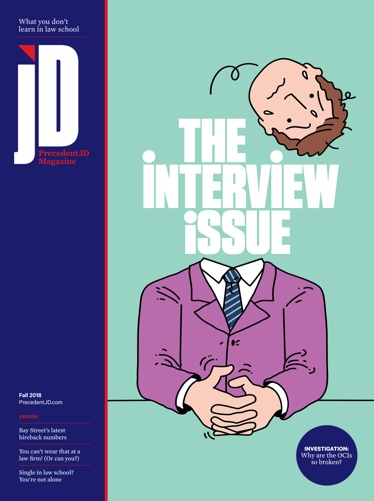
Lynn Iding has a big job. As the managing director of recruitment and career development at the Halifax office of McInnes Cooper, she sifts through hundreds of summer-student applications each year. And, once in a while, she looks up applicants on Facebook. Her goal is not to comb through their photo albums to see who funnelled a beer in undergrad. “I’m usually trying to put a face to the name,” she explains. Still, she sometimes stumbles across things she can’t un-see. For example: a few years back, she noticed that an applicant had mentioned, in a Facebook post, which firm he most wanted to work at during the summer — and it wasn’t McInnes Cooper. “It wasn’t completely unprofessional, but it did cause an impact,” says Iding. “It stuck in my mind.”
So what’s the lesson? Even though firm recruiters aren’t scouring your social-media accounts for incriminating images, they may, on occasion, plug your name into the search bar and scroll through your online presence. “You should assume that anything you post on social media is going to be public,” says Iding. “That’s the safest approach.”
To eliminate any risk, should you just stop using Facebook, Twitter and Instagram altogether? Ari Blicker, the director of student and associate programs at Aird & Berlis LLP, says that would be a mistake. Like Iding, he uses social media sparingly in the hiring process — “We’re not out there looking for dirt,” he explains — but he can think of students whose online identity actually bolstered their chances on the job market.
For instance, he once noticed that a strong applicant blogged about sandwiches, which helped break the ice in the interview. Another candidate had built a strong social media following for his jewellery and menswear business and, when Blicker noticed this, he was impressed. “This candidate was an entrepreneur,” he says. “Many of our clients are entrepreneurs, so this was exciting to see.”
In the end, Blicker was unable to hire either student. Other firms, who were probably just as impressed as he was, scooped up the top candidates.
“If students are savvy, social media can be really positive,” says Blicker. “When people are behaving responsibly and using it to create community, then I think social media is a great thing.”

This story is from the 2018 edition of PrecedentJD Magazine
Photograph courtesy of Creative Commons (CC by 2.0)
